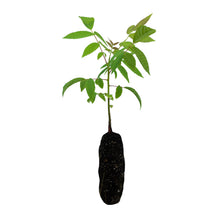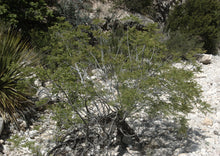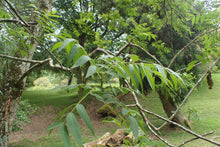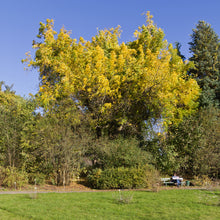
Juglans microcarpa
- Grow your own Little Walnut, a miniature version of its close relative the Eastern Black Walnut, found along the streams and ravines of Texas, New Mexico, Oklahoma, and Kansas
- 100% guaranteed
- Seed-grown on California's Redwood Coast
- Transplanting and care instructions included
 |
Moisture Medium |
 |
Cold Hardiness 0°F |
 |
Light Full Sun / Partial Shade |
 |
Size 10 – 50' tall / 10 – 30' spread |
 |
Lifespan 150 yrs |
 |
Growth Rate Fast Growing |
 |
Drought Tolerance High |
 |
Wind Resistance Medium |
About Little Walnut
From the United States Forest Service:
"Little walnut grows as a large, many-trunked shrub or small, clumped, spreading, low-branched tree. Plants may grow from 20 to 50 feet (6-15 m) in height. The strongly scented trunk is gray to dark brown and becomes deeply fissured with age. Twigs are slender, orange-reddish, gray-brown, or gray and pubescent. Little walnut is a phreatophyte with a long taproot which allows the plant to obtain water from the water table.
Alternate, odd-pinnately compound leaves are 8 to 12 inches (20-30 cm) long. The 7 to 25 narrowly ovate to lanceolate leaflets are serrate with low teeth. The leaf base is cuneate to rounded and the apex acute. The upper surface is dark yellow to green, dull and glabrous; the lower surface is somewhat paler. Leaves are glabrous at maturity and aromatic when crushed.
Little walnut is monoecious. Slender staminate catkins develop on the wood of the previous year. Yellow-green pistillate flowers are borne singly or in clusters in short terminal spikes on the current year's growth. Fruit is globose, 0.5 to 0.8 inch (1.2-2.0 cm) in diameter, brownish, and glabrous with age. The fruit is borne singly or in clusters of two or three. The indehiscent husk or shell is dark brown, thick, and fibrous. The hard, dark brown nut of little walnut is the smallest of all walnuts (Juglans spp.). It is globose to ovoid, deeply grooved longitudinally, and 0.8 to 0.9 inch (2-2.3 cm) in diameter. The kernel is sweet and oily.
The variety stewartii is characterized by slightly larger fruit (0.8 to 1 inch (21-25 mm) in length) and broader leaflets (0.6 to 0.9 inch (15-23 mm) wide). The Arizona walnut is morphologically similar to little walnut, and identification may be difficult where both species occur together."
About Jonsteen's Seedlings
About Jonsteen's 100% Guarantee
All of our trees are guaranteed to arrive healthy and in good condition. If your tree perishes despite your honest efforts, we will be happy to replace it with a small-sized seedling for just the cost of shipping/handling. You can learn more about our guarantee and tree replacement policy here.
Seedling Size Chart: Medium
Due to the dynamic nature of actively growing trees, as well as the tremendous variation between species’ growth rates, we rely on the cubic volume of a seedling’s root mass to determine its “size” (Small / Medium / Large / XL). Within each size there is minor variance — the dimensions provided here represent the category minimum. If exact measurements are essential, please contact us about current stock.








